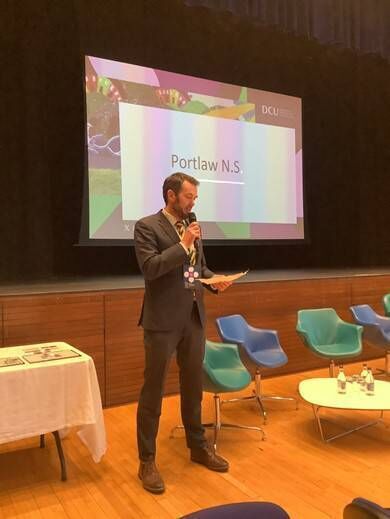SPECIAL REPORT: Waterford parents fight for education equality for their children

Melissa, holding a picture of her daughter Harper, and Jennifer, holding a picture of her son TJ.
Parents of children with ASD (Autism Spectrum Disorder) are facing an uphill battle in Waterford.
As the September 2025 term looms, Déise parents are struggling to secure spaces that will properly accommodate their children’s needs.
Between benign statements of support from various Government members and mixed messaging from the Department of Education, these parents are at a loss as to how to ensure their child’s right to education.
Mothers Melissa and Jennifer spoke to the Waterford News & Star about the difficulties they’re facing. Both women are living either in or around the city, but have to go out of their jurisdiction for their children’s education.
Melissa’s daughter Harper is pre-verbal and turns five this year. Jennifer’s son TJ is six.
Both children attend school in Passage East, which offers Early Intervention classes.
In Waterford City, there are no Early Intervention classes for children with ASD.
Only two children in their class of seven have secured a place in primary school in Passage East this autumn. Neither of those places have been given to Melissa and Jennifer, so the search continues for both families.
Parents in the city and county are being told, often on the same day, that over 10 children are waiting for a spot in one school, while another school claims that the “demand isn’t there” for ASD modules.
Across the county, particularly in Dungarvan, parents of children with ASD are struggling on waiting lists with no guarantee of a place come September.
A Special Educational Needs Organiser (SENO) works on behalf of NEPS (National Education Psychological Service) to find spaces for children going into primary school.
As Jennifer said: “I know my SENO has been out to schools looking for places, they’re bent over backwards looking. Then schools are getting back to us saying that they can’t get the funding, Ferrybank can’t get the funding on a stop-and-go system.”
According to Melissa: “NEPS is over SENO; they have to go to NEPS and see what the demand is there for the school, and they release the funding.”
Parents are told that the schools they apply for are not structurally suited to accommodate their children.
Local councillor Jim Griffin spoke about how access to funding for structural developments to accommodate children with special needs is proving elusive to schools in Waterford.
He said: “This word we keep hearing is ‘shovel-ready’; the schools need it to be ready and they need to have the resources to facilitate, be it a modular unit or a building.”
According to Cllr Griffin, schools in Waterford are eager to build modular units for these classes, it’s a matter of ‘freeing it up’.
Cllr Griffin said that teachers and principals are “at loggerheads” over the issue.
“They all want to make it happen but there’s nothing happening.”
Jennifer said: “What we’d love, and I think every other parent would as well, is instead of getting a list from SENO every year with 20, 30 schools; one application.
“I think it’s imperative that every school in County Waterford should either have an ASD module or an ASD class.
“They’re entitled to an education where they’ll thrive in smaller groups. I am refusing to put my son into a large class where I know he’ll get distressed and it could lead to anger and another child getting hurt.”

Principal at Portlaw National School Brian Barron spoke to Waterford News and Star about the issue and nodded to the issue of funding.
He said: “It’s not just an issue of special classes; it’s the whole underfunding of the special education sector.
“What the Government have to look at there is the provision of special schools, do they have enough places, and if not, why aren’t they expanding existing schools or building new schools?”
On the lack of spaces, Principal Barron said there was a backlog of applications.
“The issue has to be seen in its fullness where you have to consider the lack of spaces in special schools, first of all. That has a massive drip-down effect then where children who have a recommendation to be in a special school can’t get a special school place so they apply for a special class attached to a mainstream school.
“Those special classes may not be suitable for their needs.”
The demand for spaces has created a strange limbo where children with additional needs are applying for spaces that don’t exist.
He went on: “There’s a backlog of huge waiting lists of people applying to special schools who can’t get in, they’re then forced to apply for special classes, which there isn’t enough of, and they can’t get in there. But also children who do qualify for special classes are applying for those classes.”
Principal Barron stated that parents of children who qualify for special schools are left with no choice but to apply to a mainstream school.
He said: “Parents themselves know that their child won’t cope in a mainstream [school]. Mainstream schools are very adaptive but they’re not special schools.”
Besides the issues with noise and sensory over-stimulation, children with ASD may have toiletry requirements and accessibility needs that cannot be accommodated in a large classroom.
In Passage East, TJ and Harper were able to thrive and communicate with each other in a soothing environment in a class of six.
With the coming school year, they are worried about how their children will adjust to a drastically new environment. For a child like TJ, entering a classroom of over 20 children would be an overwhelming experience.
Melissa said: “This flipside that we’re going to be facing in September, putting them into a schooling environment with or without an SNA (Special Needs Assistant); it’s physically not going to work.”
Jennifer said: “Why should we make our children suffer when they shouldn’t have to?”
Location is a powerful factor in the services available for children with ASD. Melissa lives in the catchment area for Children’s Disability Network Team (CDNT) Waterford South, while Jennifer lives in the North catchment area.
For Jennifer’s son TJ, the team have been a great help for his development. She said: “He has speech and language, he has occupational therapy and I would suggest that any parent offered the early bird intervention course take it because it was so informative.”
However, in the case of Melissa, there has been little communication.
She said: “The CDN team here in Waterford, they’re supposed to advocate for our children individually, they have yet to see my daughter, and my daughter is five in March.
“If I changed my daughter’s location to Dungarvan, where I’m from, she’d have a dietician, a psychologist and a speech and language therapist.
“She’d be changed to the CDNT Tramore and she’d be seen, but [in] South side Waterford she hasn’t been seen. It baffles my brain.”
Both parents have had to go private to access the right care and support for their children, paying upwards of €1,650 for the assessments that led to the ASD diagnosis alone.
Melissa said: “I had to put myself in debt to get my daughter assessed, to get her in an early intervention class.”
The gap between demand and reality in terms of children with ASD going to school could be due in part to how a child is diagnosed. While Melissa and Jennifer had to go private, many families are waiting longer for their own child’s diagnosis through the HSE.
Having an older child in primary school has revealed to Melissa the glaring gaps in education between neurotypical children and children with additional needs. She said: “It is so segregated.”
As a full-time carer, both mothers have to rely on the weekly carer’s allowance. Melissa had to give up her job at Bausch & Lomb to care for Harper. It is a certain irony that while she undergoes courses that encourage carers and parents to “get back” into working, she cannot work beyond 18 hours a week at her old job, lest she lose the allowance.

The stress of the situation is taking a toll both mentally and physically for both women.
However, the issue is not going to go away anytime soon.
Jennifer said: “This is not just about this year for our children, this is going to snowball into next year.
“I’m not going to stop advocating for parents. I will fight for other children.”
The issues also impact parents in west Waterford, with Dungarvan TD Conor McGuinness using his maiden speech in the Dáil last Wednesday to highlight the crisis.
"Twenty children have been left without a space for the coming academic year in our fantastic local special school, St. John's. Their families have been left reeling and uncertain how, where or if the right to education of their children will be vindicated.
"This lack of special school places did not happen overnight, but it has now reached crisis point," he said.
Similar to the pleadings of Melissa and Jennifer to the Department of Education in relation to Waterford city and east Waterford, he called on the Ministers in the Department to urgently address the situation west of the county.
"I ask the Minister of State to raise with his colleague, the Minister for Education, the urgent need to increase special school capacity in Dungarvan and west Waterford to ensure all children can access an education appropriate to their needs now and into the future."






